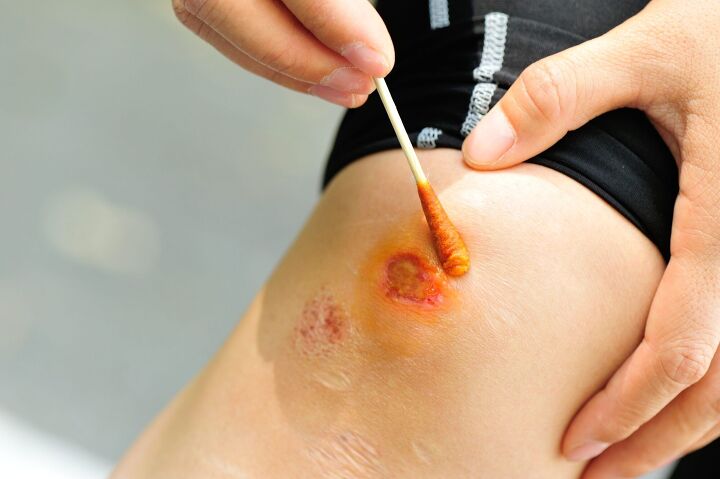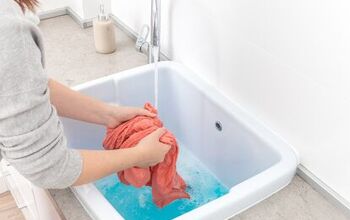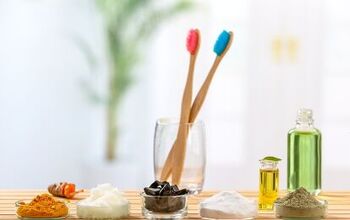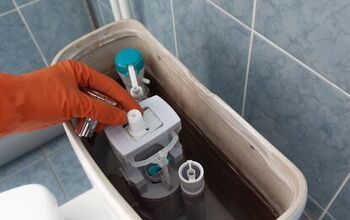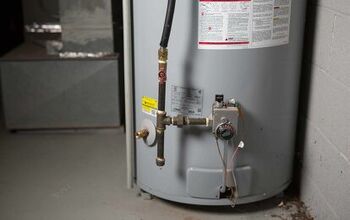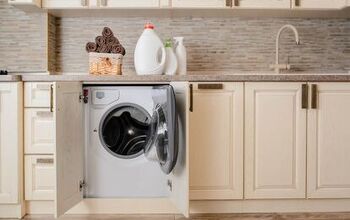Iodine Vs. Hydrogen Peroxide: Which One Should Be In Every Medicine Cabinet?

Your medicine cabinet, while it may be hidden behind a mirror in most cases, houses some of your most crucial items. From bandages to medication, there are items in your medicine cabinet that can help during an emergency and nurse those under your roof safely back to health. Real estate in the medicine cabinet can be cut-throat, as there is only so much room to fit pills and potions. So, when you have to decide on a topical solution to use on minor cuts and scrapes, you might wonder if iodine or hydrogen peroxide is better.
Both hydrogen peroxide and iodine solutions are great to have in your medicine cabinet. Both help prevent infection when applied to minor cuts and scrapes. Hydrogen peroxide has become more popular as it has potentially more household uses, including being used as a cleaning product. Hydrogen peroxide is also colorless, while iodine can stain and leaves a color on the skin.
In many regards, whether you choose hydrogen peroxide, iodine, or both, often depends on your own personal experiences and preferences. While both are great to use on minor cuts and other potential infection-inducing situations, they do have some differences. In this article, we will point out those differences as well as the pros and cons of each product. Once you understand all this, you should be able to determine whether hydrogen peroxide or iodine is best for your medicine cabinet.
Why Put Hydrogen Peroxide Or Iodine In Medicine Cabinets?
If you carry band-aids in case of an accident, then you should also carry hydrogen peroxide or iodine. This is because if you have a minor cut or scrape, the odds are you need to disinfect it. This is particularly true if you got this cut out in nature, for example on a hike or while surfing .
Both hydrogen peroxide and iodine are effective agents at killing germs on topical wounds. They are effective at being a first line of defense against infection. In essence, if you use hydrogen peroxide or iodine on a minor cut or scrape, you help drastically reduce the chances that this minor injury can turn into something major.
After all, minor cuts that are not properly disinfected can cause major infections. Even terrible things like gangrene and blood poisoning can grow from an untreated minor cut. Using either hydrogen peroxide or iodine helps mitigate those risks and keeps your minor injury exactly that — minor.
Common Uses For Hydrogen Peroxide And Iodine
Now that you know why hydrogen peroxide and iodine are critical to have in your medicine cabinet, it is helpful to know some of their common uses. Keep in mind that while these two items have many similar uses, other uses are unique to one or the other.
Cuts And Scrapes: Both iodine and hydrogen peroxide are used for their antimicrobial benefits. They are applied to minor cuts and scrapes, especially those that take place in a natural and non-sterile environment. They both help reduce the chance of infection.
Oral Hygiene: Iodine and hydrogen peroxide are both used in oral hygiene matters. Iodine has also grown in popularity, as it may also help decrease gum and tooth decay.
After Leaving An Ocean Or Lake: These products are both great to have on hand after an encounter in the water. If you have any open cuts or scabs that washed away while in the water, it is helpful to wash them and then use a bit of hydrogen peroxide or iodine. There are lots of types of bacteria in the ocean and in lakes.
Household Cleaning: Hydrogen peroxide in particular is known for being used in several household cleaning solutions. From disinfecting sponges to whitening coffee mugs, hydrogen peroxide has proven itself to be quite a valuable product in the realm of DIY cleaning solutions.
Key Differences Between Hydrogen Peroxide And Iodine
Both hydrogen peroxide and iodine are known to be effective antimicrobials. But while both are great at killing live bacteria on minor scrapes and cuts, they do have some key differences that are worth noting.
Color
For one, these two substances are vastly different in appearance. Hydrogen peroxide is clear and almost looks like water until you apply it to a scrape. Once applied to a wound, hydrogen peroxide does its famous “bubbling” at the site of the abrasion. This bubbling is a chemical reaction where the oxygen escapes the hydrogen.
Iodine could not look more different than hydrogen peroxide. Forget the lack of bubbles, it’s the color that makes iodine so different. It is the color of a deep coffee or rich molasses. When applied to the skin, this dark caramel tone stays on the skin. It does not stain the skin, and it will eventually wear off, but it definitely leaves a more lasting presence than hydrogen peroxide.
Versatility
Both iodine and hydrogen peroxide can be used for a variety of purposes, from light flesh injuries to oral hygiene purposes. But hydrogen peroxide has proven itself to be a more versatile solution when it comes to projects around the house. This is because hydrogen peroxide can disinfect products without leaving a toxic trace, or a stain. So, while iodine is great at disinfecting, it can’t remove stains; in fact, it causes stains.
Chemical Makeup
Hydrogen peroxide and iodine also have vastly different ingredients. This is also why you can often find iodine in a small glass bottle while hydrogen peroxide comes in a larger, dark-colored bottle. This dark plastic bottle helps reduce its interaction with sunlight.
Iodine can come in a smaller bottle because you generally don’t need as much of it. You are often able to apply it with a dropper, whereas you tend to use a bit more hydrogen peroxide on a cut and pour it on.
Pros And Cons Of Iodine And Hydrogen peroxide
Pros Of Having Iodine In The Medicine Cabinet
- Antimicrobial: One of the best things about iodine is its natural antiseptic qualities. From helping with minor cuts to helping prevent cavities and gum disease, iodine in many ways is a miracle solution.
- Trusted For Hundreds Of Years: Iodine also has time on its side. This solution has been trusted in medicine for more than 170 years and is still used today. This proves it has a lasting impact and is likely here to stay.
- Long Lasting: While its stains might be annoying, it is good to know that iodine keeps working for up to several hours after applying it.
Cons Of Iodine In The Medicine Cabinet
- Not As Versatile: While iodine has many great uses, hydrogen peroxide is the more veritable of the two. Iodine cannot be used in most household cleaning ways that hydrogen peroxide can.
- Leaves Stains On Skin: Perhaps the biggest drawback to iodine is the fact that it stains. This means it stains the skin temporarily, and also stains any other objects it comes in contact with.
Pros Of Hydrogen Peroxide In The Medicine Cabinet
Many Potential Uses: One of the best things about hydrogen peroxide is its range of potential uses throughout the home, from cleaning your toothbrush to cleaning your gas stovetop. This makes it a product nearly everyone can find useful.
Effective Antimicrobial: It is effective at removing bacteria from minor cuts and even the mouth.
Clear Color, Doesn’t Stain Skin: Unlike iodine, which can stain skin and clothes and all sorts of things, hydrogen peroxide is clear.
Cons Of Hydrogen Peroxide In The Medicine Cabinet
Not As Effective As Iodine With Oral Hygiene: Iodine has been linked to reducing cavities and gum disease, and hydrogen peroxide is a cleaner, rather than a decay reducer.
Can Damage Some Surfaces: While hydrogen peroxide is great because it does not stain, it can damage some surfaces. Its chemical makeup and slight acidity can damage certain household surfaces including marble and granite countertops.
Summing Up Which Is Better: Iodine Or Hydrogen Peroxide
Both iodine and hydrogen peroxide have their benefits, and either one will be a welcome addition to your medicine cabinet arsenal. It is important to note that iodine has been around in medicine for almost 200 years and is still trusted today. Still, it does tend to stain the skin and other surfaces. Hydrogen peroxide, while not as effective as iodine in some regards, is a more versatile. You can use it in several household cleaning solutions to remove stains and disinfect surfaces.
Related Guides:

Tom Gaffey is an expert writer who currently resides in Washington D.C. Tom has a passion for real estate and home improvement writing, as well as travel and lifestyle writing. He lived the last twelve years in Hawaii where he worked closely with luxury resorts and event planners, mastering his knowledge of aesthetics and luxury products. This is where he found his passion for home improvement and a keen interest in DIY projects. Currently, Tom resides in Washington D.C, and also working on his debut fiction novel.
More by Tom Gaffey



